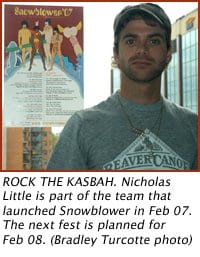In February, Ottawa is usually cold and bitter, a city blanketed in ice and sleet. For the gay community, that usually means hibernation.
Last year, organizers of Snowblower showed that if there’s a way to rouse the city from its slumber, it’s with frank talk about sex: workshops about sex, discussions groups about sex, movies about sex — and sizzling social nights.
Now, a second month-long festival of events geared towards gay and bi men is in the works, hoping to melt winter’s bitterness away.
Planners of the AIDS Committee Of Ottawa-spearheaded event organized a Sep 20 consultation meeting held at the Jack Purcell Community Centre. ACO’s Adam Graham says the consultation was a chance for the public to see what Snowblower is — and what it isn’t.
“People don’t have to put a lot of their own time and energy into it,” says Graham. “The planning this year is very easy. The people working with Snowblower this year are a much more diverse group, so there’s lots of people from different community agencies who have decided to come on this year instead of being so focussed within a couple of agencies.”
Nicholas Little, ACO’s Men’s outreach coordinator, says consultation meetings are always useful to see what community members want.
“It’s always tricky to get folks to come out to a meeting like this,” says Little.
This time around Snowblower organizers have delegated much of the responsibility for events to the organizations hosting them, allowing the community to take more ownership over the events, a decidedly grassroots approach.
“We’re moving away from the idea of having it relatively centrally controlled. It’s really good to see that, because it means people actually do believe in some of the concepts of gay men’s health and wellness. They’re taking on bits of that ownership for themselves,” says Graham.
The planning for last year’s Snowblower took around five years to plan, and Graham says getting it off the ground was a success in itself.
Many of last year’s events will re-emerge this year, including a workshop for people living with HIV titled Survive To Thrive.
“Last year, we had a group come up called the Bereavement Project from Toronto. The response we got from that was it was really successful; it was particularly for long-term survivors, exploring some issues around long-term survivors and how that might differ from people who were more recently infected,” says Graham. “Anecdotally, the responses were very positive for that kind of workshop, so we’re hoping to offer a couple of workshops that would incorporate some of those elements again this year.”
Other noteworthy events being duplicated include the two-spirit workshop, which deals with aboriginals who identify with both genders.
One suggestion brought forth at the consultation meeting would see notable gay men’s health workers from the US discussing wellness as a concept in our community.
“Hopefully, that would be a bit of a seed as a community to take on as rethinking gay men’s wellness within the context as a whole person.”
Barry Deeprose, co-chair of the Gay Men’s Health Initiative Working Group, hopes that this year anyone who would like to participate will have a chance to.
“We’re not going to overlook the disenfranchised; not everyone has the disposable income that people have come to think all gay men have. We’re going to try to make some, if not all, of the events free,” says Deeprose.


 Why you can trust Xtra
Why you can trust Xtra


